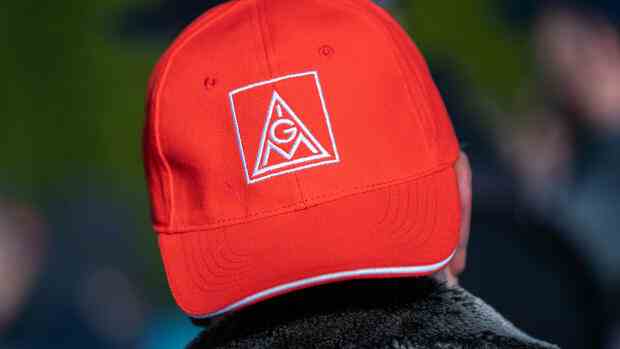Berlin At IG Metall, a generational change is imminent this year: at the trade union conference in October, a decision will be made on the successor to the first chairman, Jörg Hofmann. However, there are two aspirants for the job.
And the union leadership is currently visibly trying to avoid a showdown between the two in the fall. The board will get an opinion by March, and before the summer break it will then make a personnel proposal, Hofmann said on Thursday at the annual press conference.
It is traditional at IG Metall that the second chairman inherits the first at some point. According to this, Christiane Benner would now be the first woman to head the largest trade union in the free world. The 53-year-old is responsible for organizational and co-determination policy and takes care of target group work, but has no experience in collective bargaining policy.
Unlike Roman Zitzelsberger. The 56-year-old district manager in Baden-Württemberg negotiated the pilot agreement for the 3.9 million employees in the metal and electrical industry last November.
Top jobs of the day
Find the best jobs now and
be notified by email.
IG Metall boss Hofmann made it clear on Thursday what is particularly important to him: “Collective bargaining is and remains the brand core of unions – and that’s what we are ultimately measured by.” At the same time, he also praised the successful works council work, which brought many new members to the union brought – and Benner is responsible for that.
>> Also read here: IG Metall: maintain pension at age 63
Consideration is now being given to introducing equal dual leadership as part of the organizational reform that was planned anyway. To do this, however, the delegates at the trade union congress in the fall would have to adopt a two-thirds majority to amend the statutes.
However, it is unclear whether this will come about. Because critics ask why the statutes should be changed now, when for the first time a woman has the chance to get to the top. Incidentally, this question is not only asked by female members, said Benner on Thursday.
Still union boss Hofmann avoided questions on Thursday as to whether he could imagine a double leadership: It is up to the two people in the future management duo how they interpret their role.
A woman at the top?
In private, Benner has so far shown little willingness to back down in favor of Zitzelsberger. In May last year she could have become the new chairwoman of the German Trade Union Confederation (DGB) if she had wanted to. However, she decided to continue pursuing her career plans at IG Metall.
>> Also read here: Textile and clothing industry: IG Metall wants eight percent more money
On Thursday she said only that one must think about a modern team structure and see which management model is good for the union. If she couldn’t imagine a double leadership at IG Metall, she wouldn’t promote it. In 2003 there had already been a power struggle between Jürgen Peters and Berthold Huber over the successor to union boss Klaus Zwick.
The planned reduction of the union’s executive board from seven to five members is also causing a lot of trouble behind the scenes. This could help to “break down one or the other silo mentality” and promote teamwork – even at the top, said Hofmann.
So far, the seven-strong board has represented the range of the union from a very far left wing around the social expert Hans-Jürgen Urban to the more pragmatic wing. The reduction in the size of the Management Board would also take into account the goal of IG Metall “thinking more from the point of view of operations”, i.e. above all intensifying the work in the offices and plants.
Losing members continues
In terms of size, the most powerful German union continued to shrink in 2022. At the end of the year, IG Metall had almost 2.15 million members – one percent less than a year earlier.
However, the collective bargaining round in the metal and electrical industry, which ultimately gave employees a two-stage collective bargaining increase by a total of 8.5 percent plus an inflation compensation premium of 3,000 euros, led to a “terrific catch-up race” in the number of members in the second half of the year, said Hofmann. The 117,000 new admissions last year are “a great success”. This is the biggest increase since 2018.
IG Metall received 596 million euros from membership fees, four million euros more than in 2021. Of the money, 215 million euros flowed into the offices. Traditionally, IG Metall sets aside 15 percent of the income to be prepared for strikes, for example.
No labor dispute will fail because of money, said board member and chief cashier Jürgen Kerner. The 54-year-old Bavarian should be confirmed in his post in the fall, if he doesn’t even emerge as the laughing third party from an unresolved dispute between Benner and Zitzelsberger.
Kerner announced an “Industrial Electricity Price Action Day” for March 9 in the steel industry. In the energy-intensive industries, the high energy prices endangered jobs on a massive scale: “Germany must quickly introduce an industrial electricity price brake.”
More: IG Metall criticizes working conditions at Tesla
